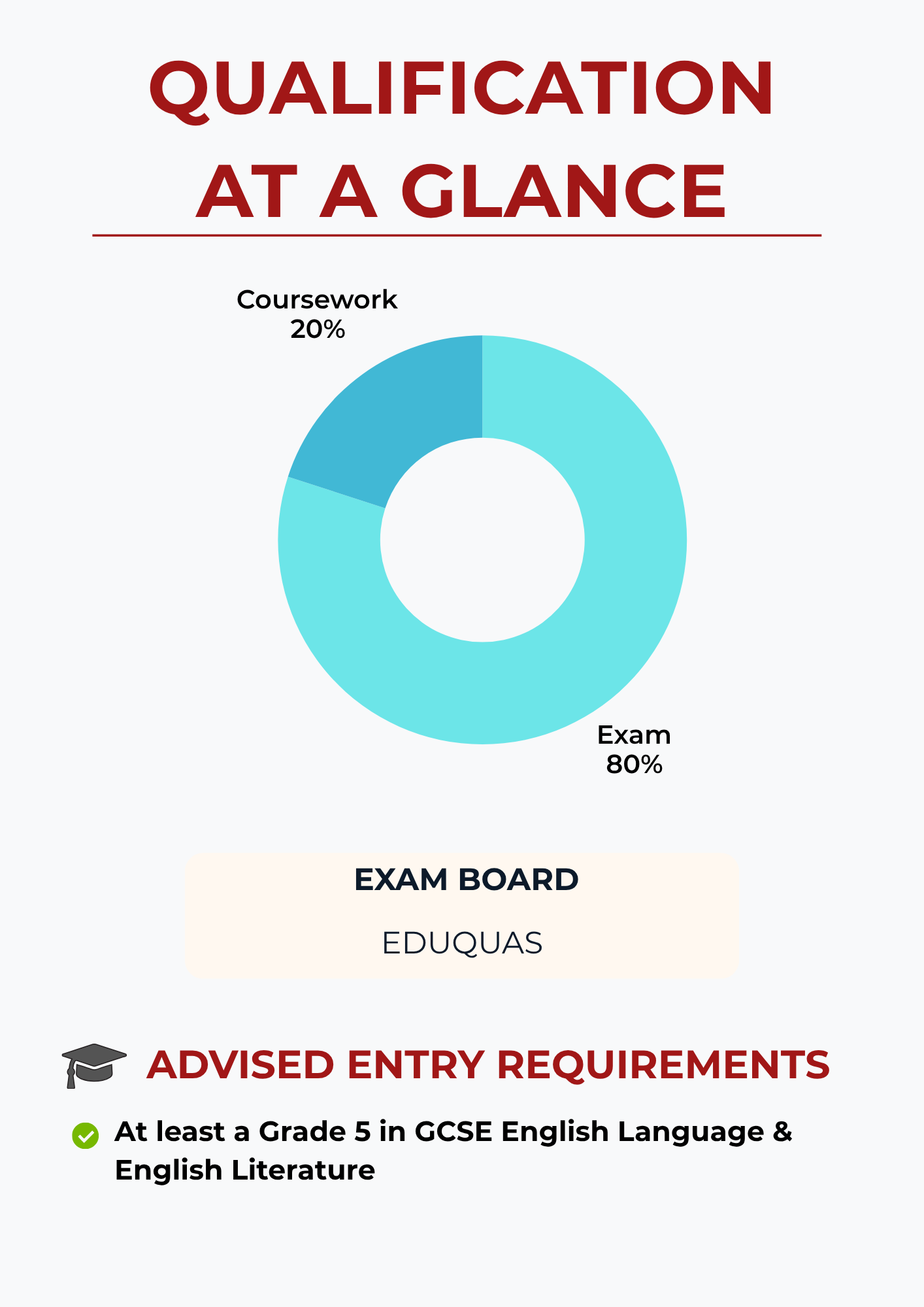A Level English Literature (Eduqas)
Why Choose English Literature?
English Literature invites you to explore how words have shaped human thought, culture, and emotion across centuries. In a world overflowing with content, stories remain our most powerful way to make sense of experience and to challenge the status quo.
Through the lens of critical theory, you’ll examine how ideas about power, gender, identity, and society influence both what is written and how we read it. You’ll study voices from Shakespeare to the present day — from the power struggles of tragedy to the quiet rebellions of contemporary fiction — always asking what literature reveals about who we are and who we might become.
Whatever your future path, the ability to think deeply, read critically, and express ideas with precision will set you apart. English Literature will help you understand not just the world of books, but the world itself.
Exam Board
We follow the Eduqas specification for A Level English Literature.
How Is the Subject Assessed?
Assessment takes place over two years through a combination of debates, group presentations, research projects, and written essays.
-
80% of the final grade is based on written examinations.
-
20% is based on coursework.
What Will You Study?
Component 1 – Poetry (30%)
-
William Blake – Songs of Innocence and Songs of Experience (pre-1900)
-
Carol Ann Duffy – Mean Time (post-1900)
-
Philip Larkin – The Whitsun Weddings (post-1900)
Component 2 – Drama (30%)
-
Shakespeare: Hamlet
-
A Streetcar Named Desire – Tennessee Williams
-
The Duchess of Malfi – John Webster
Component 3 – Unseen Texts (20%)
-
Unseen Prose
-
Unseen Poetry
Component 4 – Coursework (20%)
A 2,500–3,500-word comparative analysis of two prose texts from different periods — one pre-2000 and one post-2000.
Enrichment Opportunities
Through our partnership with the Royal Literary Fund, students have the opportunity to learn directly from professional writers who inspire creativity and refine their craft.
We also take learning beyond the classroom through theatre trips and live performances, bringing the texts we study to life. Whether analysing dialogue on the page or seeing it performed on stage, students develop a deeper appreciation of language, performance, and storytelling.
Costs
Students are encouraged to purchase recommended texts for wider reading, though copies may be borrowed from teachers.
Students may also be asked to contribute to theatre trip costs.
Student Voice
“Studying English Literature at A Level was one of the most rewarding experiences I’ve had. It connects with so many other disciplines — history, philosophy, psychology, and religion — making every text rich with meaning and context.
I loved the variety, from Shakespeare to post-war plays, and how much deeper our analysis went compared to GCSE. Exploring critical perspectives completely changed the way I read and understand literature. The teaching was outstanding — the department inspired discussion and arranged theatre trips that brought our studies to life.”
— Ellie, former student, now studying History at the University of Cambridge
“When I first visited John Kyrle, I knew it was somewhere special. Coming from a school focused on computer science, it felt like a place that valued both academic excellence and creativity.
I chose A Level English Literature because of the passion of the teachers I met at Open Evening. The course felt alive — full of opportunities to explore, question, and express individuality.
Smaller classes meant richer discussions, and the English department created such a welcoming, inspiring atmosphere. Studying English Literature at John Kyrle shaped who I am today — it gave me confidence, curiosity, and the courage to pursue opportunities like studying abroad.”
— Alfie, former student, now studying English and Film at the University of Manchester
Qualification at a Glance
Exam Board
Eduqas – A Level English Literature
Assessment
-
80% Exam (three written papers)
-
20% Coursework (comparative analysis of two prose texts)
Course Components
-
Poetry – Blake, Duffy, Larkin (30%)
-
Drama – Shakespeare, Williams, Webster (30%)
-
Unseen Texts – Prose and Poetry (20%)
-
Coursework – Comparative essay (20%)
Entry Requirements
Students should have achieved at least a Grade 5 in GCSE English Language and English Literature.
Skills Developed
-
Analytical and interpretive reading
-
Essay writing and literary criticism
-
Research and independent thinking
-
Creative and critical communication
